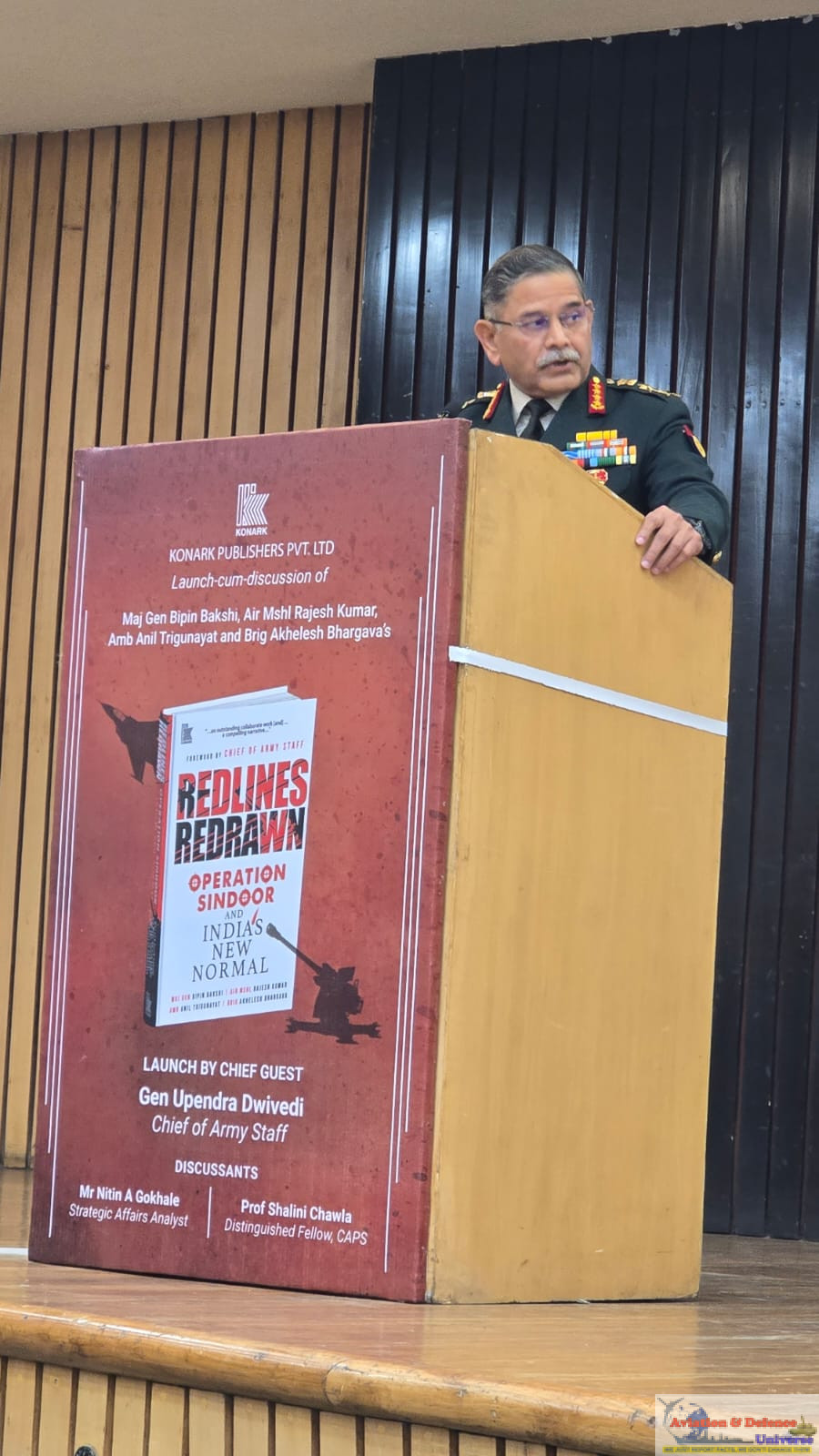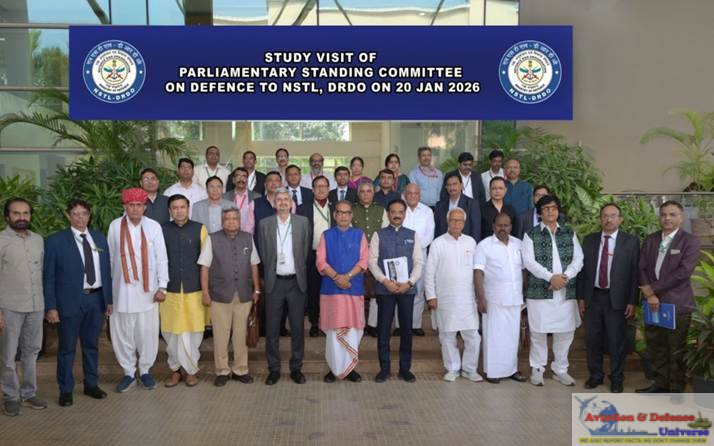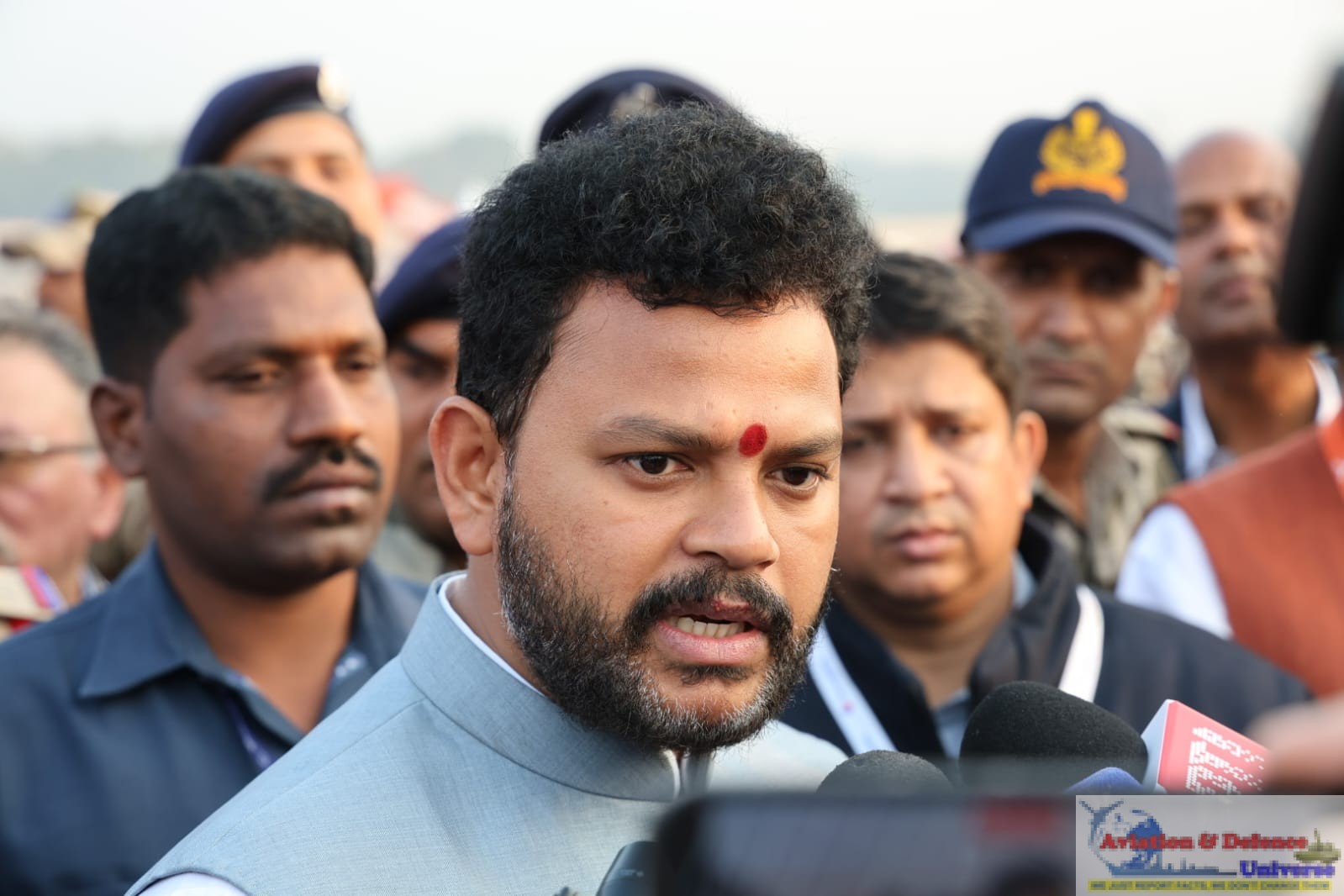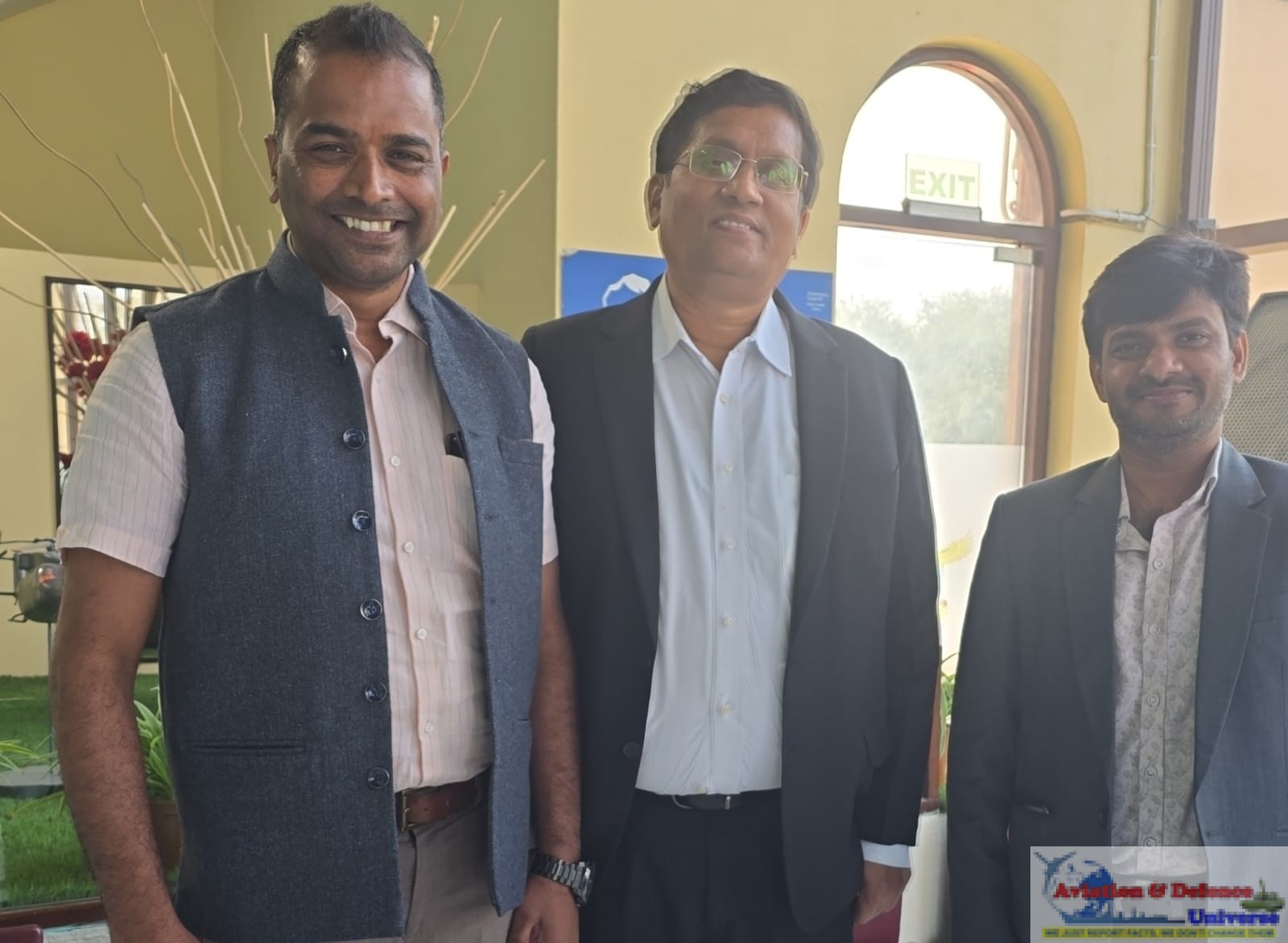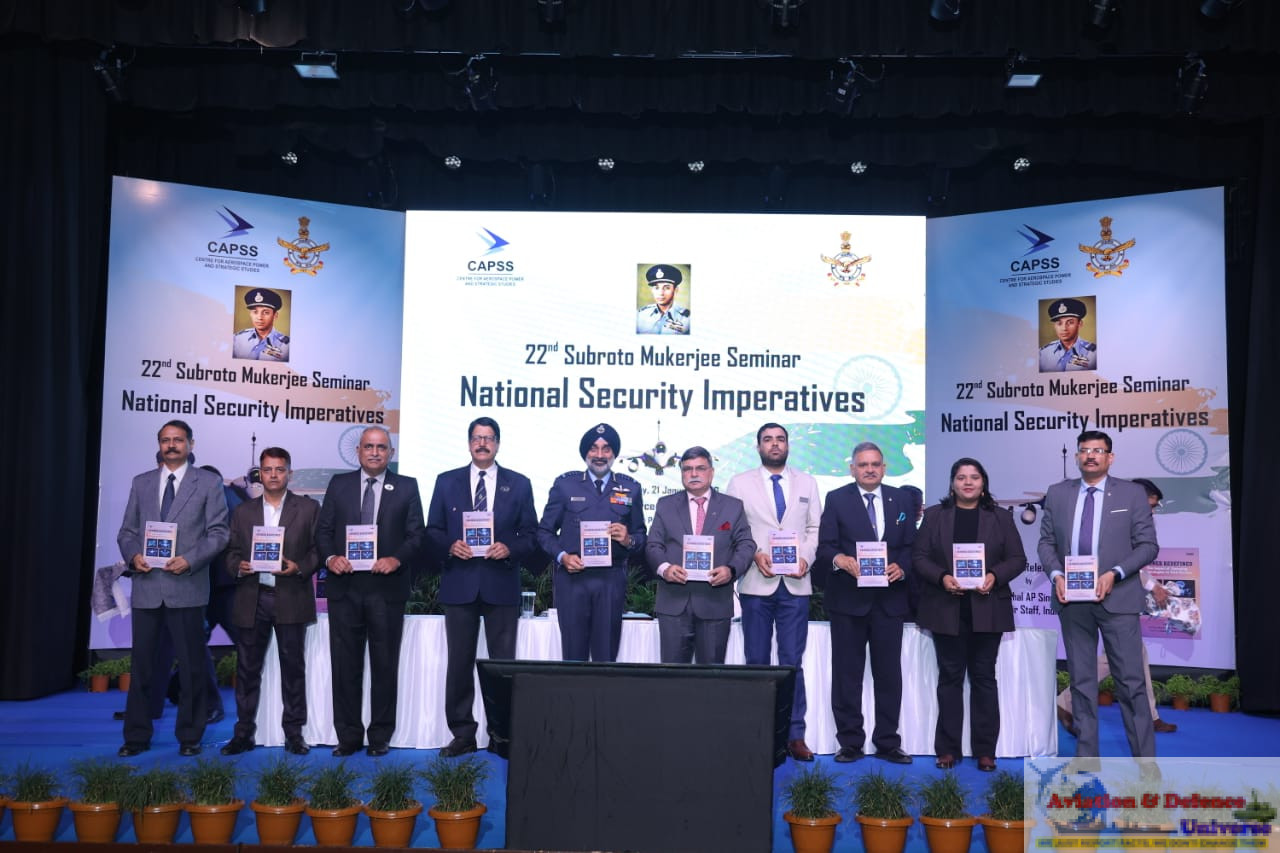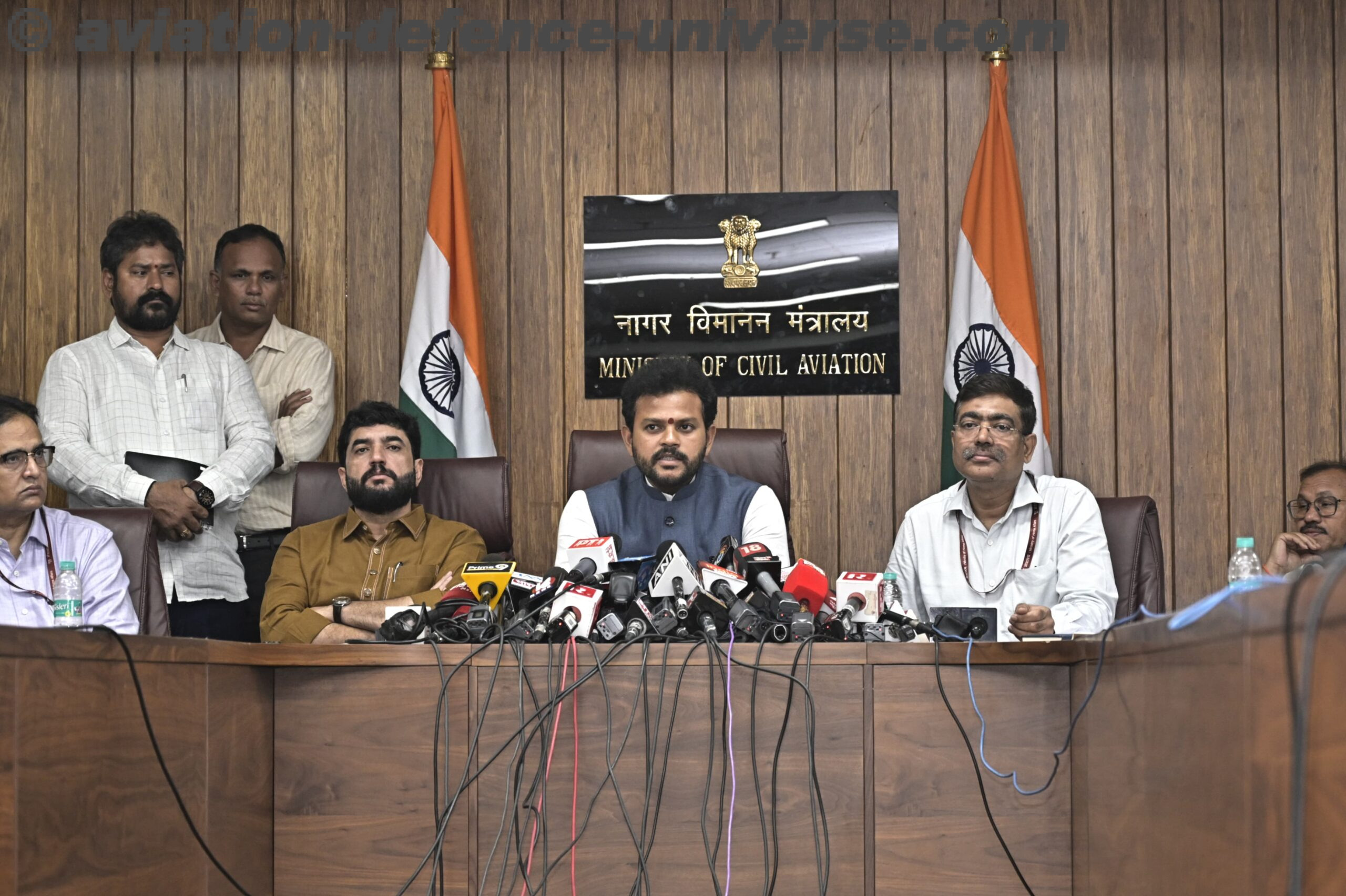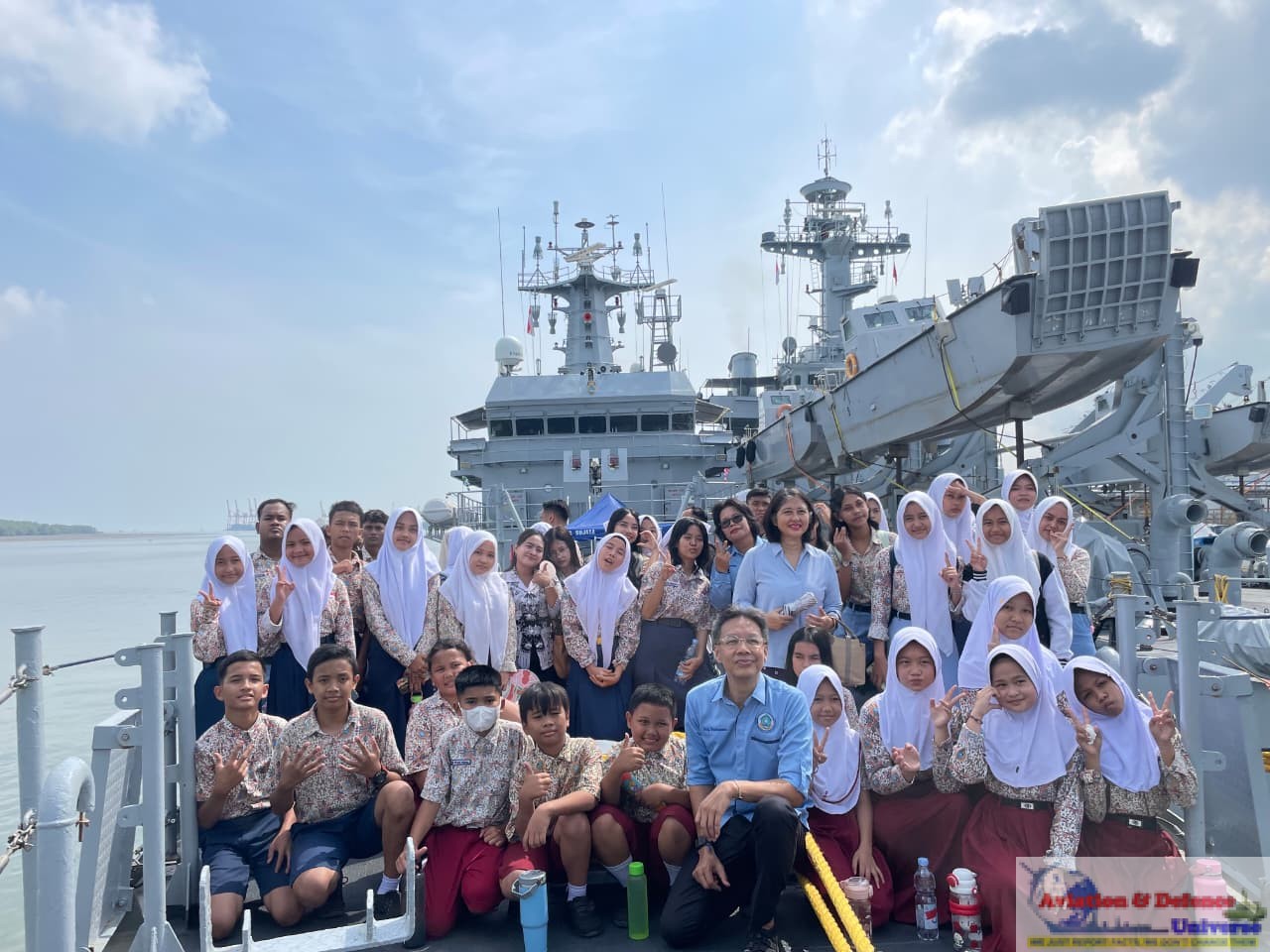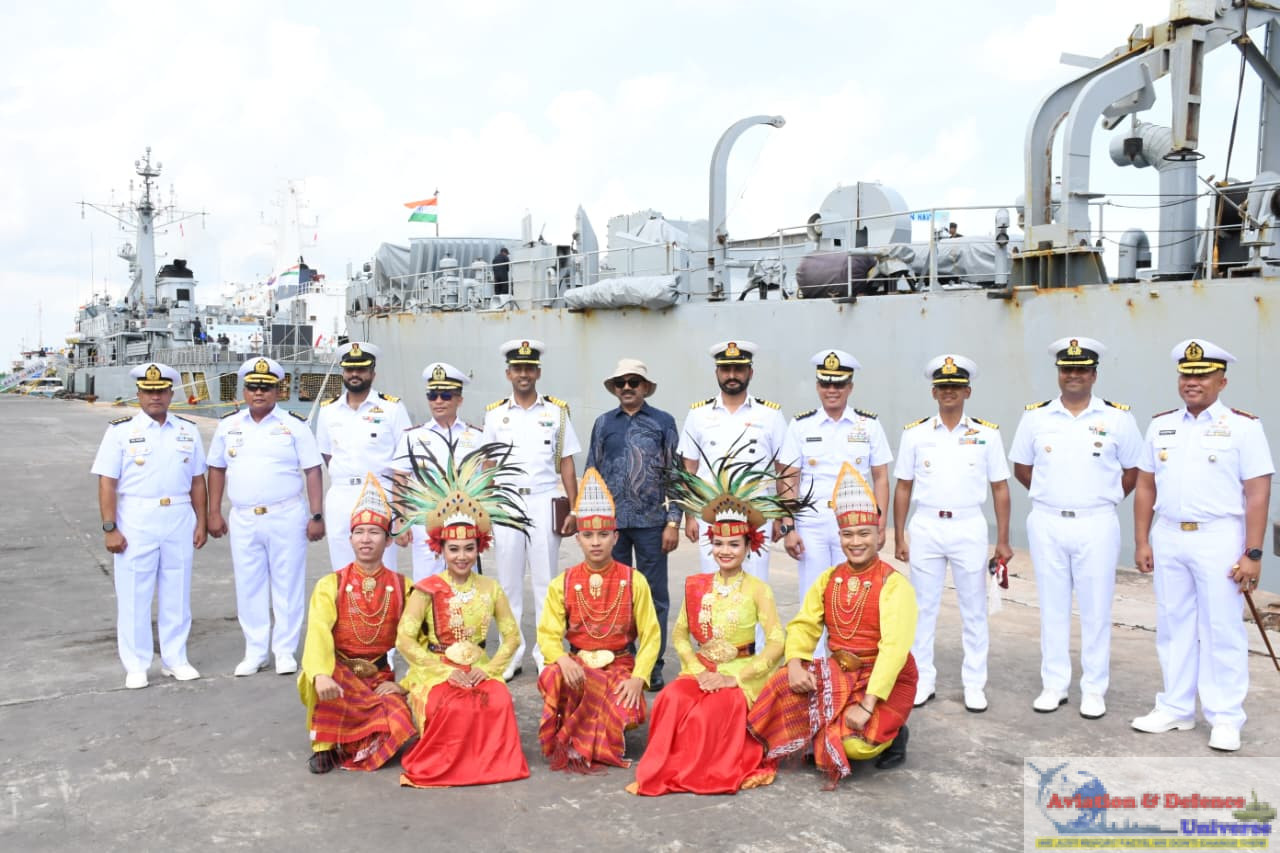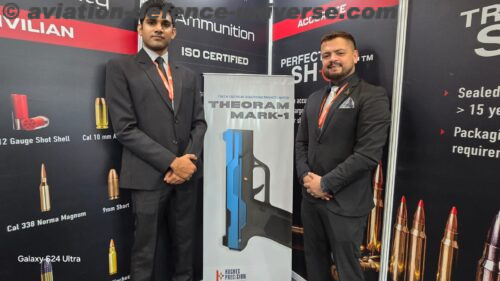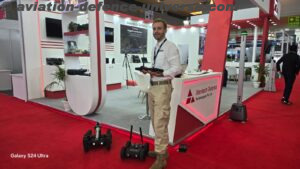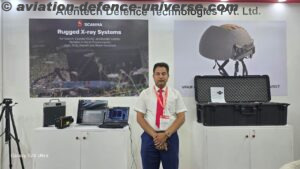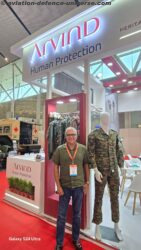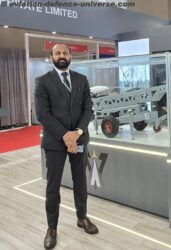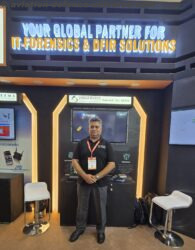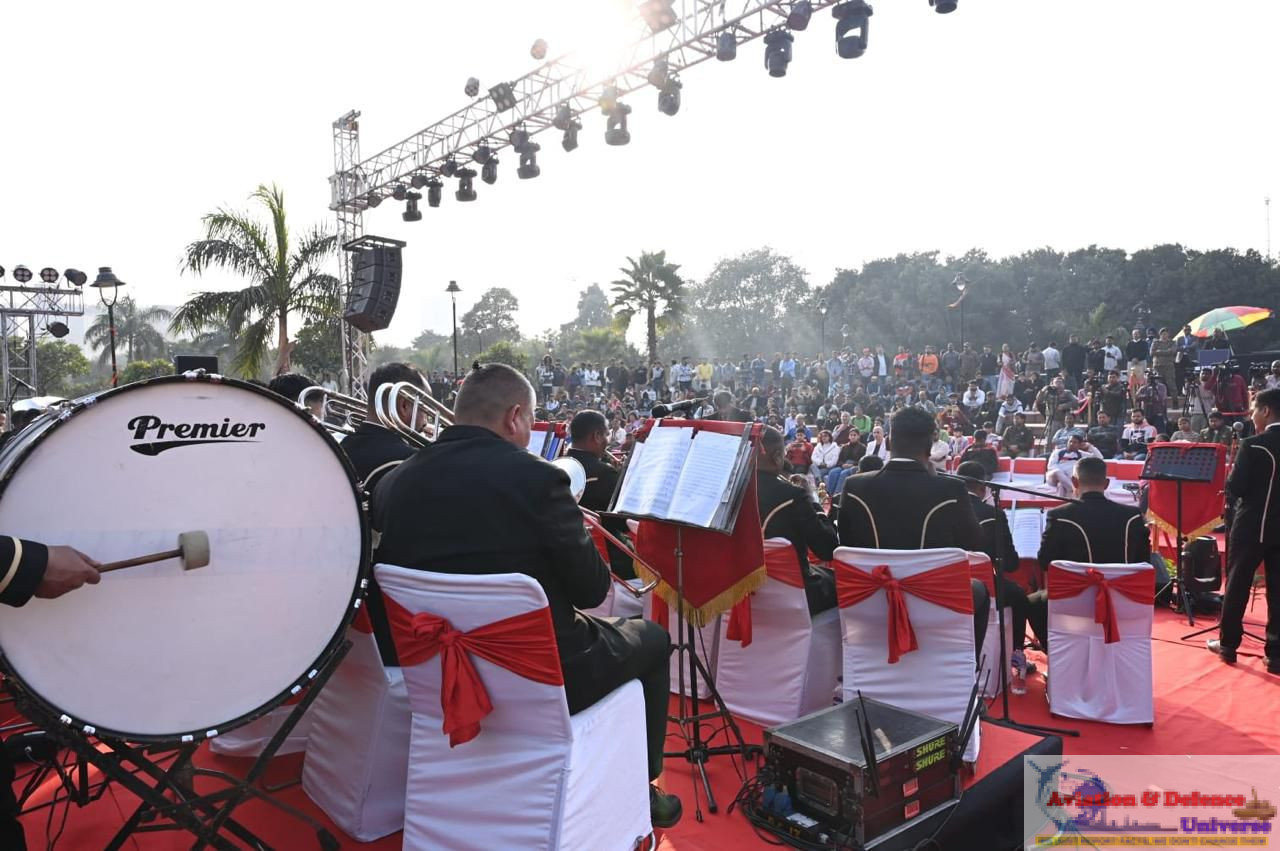- Startup Spotlight. Non-Lethal Innovation for Women’s Safety and Paramilitary Use
- Co-founders Aditya Krishna Pandey & Ankur Indoria spoke with Aviation & Defence Universe (ADU) at Milipol India 2025
By Sangeeta Saxena
New Delhi. 29 April 2025. At Milipol India, amid displays of cutting-edge weaponry and security technologies, a quiet revolution was taking shape—a tactical gun that doesn’t kill. In an exclusive conversation with ADU (Aviation & Defence Universe), Aditya Krishna Pandey, co-founder of a Bengaluru-based startup, introduces us to India’s first indigenous non-lethal tactical pistol. The innovation, aimed at law enforcement and civilian self-defence, promises to be a game-changer in non-lethal deterrence technology.
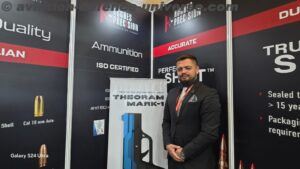 At Milipol India 2025, TRETA Tactical Solutions showcased its latest innovation in non-lethal defence—the Theoram Mark-1, a compact and efficient non-lethal pistol designed for both law enforcement and civilian self-defence. Engineered with precision, the Theoram Mark-1 is capable of firing proprietary chemical irritant projectiles, delivering effective deterrence while minimizing the risk of permanent harm. The weapon features a lightweight polymer frame, ergonomic grip, and intuitive safety mechanisms, making it user-friendly even under high-stress situations. With a focus on rapid deployment and incapacitation without lethality, TRETA’s offering addresses the growing demand for safe yet effective alternatives to conventional firearms in riot control, perimeter security, and personal protection scenarios.
At Milipol India 2025, TRETA Tactical Solutions showcased its latest innovation in non-lethal defence—the Theoram Mark-1, a compact and efficient non-lethal pistol designed for both law enforcement and civilian self-defence. Engineered with precision, the Theoram Mark-1 is capable of firing proprietary chemical irritant projectiles, delivering effective deterrence while minimizing the risk of permanent harm. The weapon features a lightweight polymer frame, ergonomic grip, and intuitive safety mechanisms, making it user-friendly even under high-stress situations. With a focus on rapid deployment and incapacitation without lethality, TRETA’s offering addresses the growing demand for safe yet effective alternatives to conventional firearms in riot control, perimeter security, and personal protection scenarios.
ADU. So we’re meeting here at Milipol. Aditya, what are you showcasing?
Aditya & Ankur. Ma’am, we are showcasing India’s first non-lethal tactical pistol. Our guns don’t kill—they immobilise. They’re designed purely as deterrent devices. Our Launchers our designed to Defend and not cause any permanent damage, They are designed to immobilize an intruder and Provide arrest assistance or a window to fled a dangerous situation
ADU. That’s remarkable. Is this the first of its kind?
Aditya & Ankur. Globally, there are similar products, but not in the same calibre or energy specifications that we are working with. So yes, in terms of design and efficiency, this version is unique.
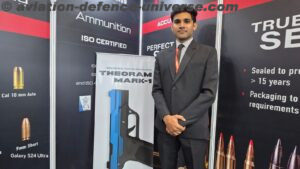 ADU. Can you tell us more about how it works?
ADU. Can you tell us more about how it works?
Aditya & Ankur. It looks, feels, and shoots like a real gun but it is NOT a firearm, it fires a Projectile. When it hits the target, it causes severe eye burning, coughing, and nasal irritation for up to an hour. It’s designed to incapacitate, not injure.
ADU. Like a pepper spray gun?
Aditya & Ankur. Similar in concept, but unlike pepper spray, which needs close proximity, our product has an effective range of 60 feet for civilian versions—more for law enforcement.
ADU. Is this your only product?
Aditya & Ankur. Not at all. This is just the beginning. We are building an entire range of non-lethal products—from pistols to rifles and restraining devices. Some are still in the R&D or trial phase.
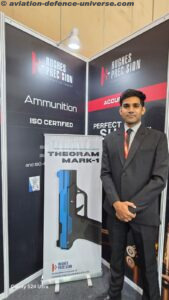 ADU. And your association with Hughes Precision?
ADU. And your association with Hughes Precision?
Aditya & Ankur. Mr. Sanjay Soni, the MD of Hughes Precision, is one of our mentors. We are a startup and they are guiding us in this journey, so we’re showcasing under their banner here at Milipol.
ADU. What stage is your product in now?
Aditya & Ankur. We are set to launch in June. Our internal trials are almost complete, and we begin demonstrations by the end of May.
ADU. Have you reached out to the armed forces?
Aditya & Ankur. We are in talks with paramilitary forces. Once we build credibility there, we’ll approach state police departments. That’s our phased plan.
ADU. What about civilians? Is there a plan for that market?
Aditya & Ankur. Absolutely. Our primary civilian market is women.
ADU. Do we need a licence for it?
Aditya & Ankur. The device doesn’t require a license as its NOT a firearm and due to its Caliber and Low velocity. We’ve built it to be accessible, but we’ll ensure strong KYC procedures to avoid misuse.
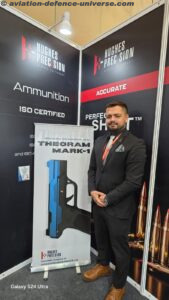 ADU. Can it be carried during air travel?
ADU. Can it be carried during air travel?
Aditya & Ankur. To ensure greater compliance and ease of transport—especially for women traveling short distances—we are developing Phase 2 versions of the device in compact, utility-inspired formats such as flashlight-style models or variants that can be safely checked in during travel. This approach enhances both accessibility and discretion, empowering users with a practical safety solution
ADU. Tell me about your backgrounds. You’re both young—how did this idea come about?
Aditya & Ankur. I’m a lawyer by training. Always fascinated with defence, especially firearms. I couldn’t join the armed forces but stayed passionate. My co-founder Ankur and I have known each other for years. He was once a customer of a former venture. We bonded, brainstormed, and realised the need for such a product in India—especially for women’s safety.
ADU. When did you formally start?
Aditya & Ankur. We incorporated in November, but R&D began almost a year ago. We didn’t want to be the kind of startup that rushed to the spotlight. We wanted something tangible before going public.
ADU. What’s the price point?
Aditya & Ankur. We are aiming for affordability. Around ₹20,000 for the pistol. A pack of 500 projectiles would cost ₹5,000. It’s significantly cheaper than most air guns.
ADU. Are you planning to expand globally?
Aditya & Ankur. Definitely. We’re exploring markets in Europe, the Middle East, and Africa. The response at Milipol has been encouraging. Shows like DSEI and Eurosatory are on our radar. We’ll move there once our domestic footprint is stronger.
The global non-lethal deterrent equipment market is experiencing significant growth, driven by increasing demand from law enforcement, military, and civilian sectors. In 2024, the market was valued at approximately USD 8.71 billion and is projected to reach over USD 13.25 billion by 2032, growing at a CAGR of 5.8% from 2025 to 2032 . This growth is fueled by the need for effective crowd control solutions, rising civil unrest, and advancements in technology that enhance the safety and effectiveness of non-lethal weapons.
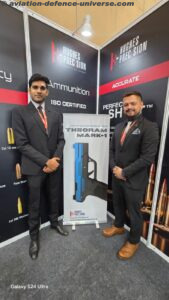 Non-lethal deterrent equipment encompasses a range of technologies designed to incapacitate or deter individuals without causing fatal injuries. Key product categories include chemical agents like pepper sprays and tear gases, electroshock devices such as tasers, kinetic impact projectiles like rubber bullets, and acoustic or light-based devices. Innovations in these areas have led to more precise and targeted solutions, minimizing collateral damage and improving operational efficiency . For instance, electroshock weapons now feature adjustable voltage and pulse patterns, while chemical agents are being developed with formulations that dissipate quickly to reduce long-term health effects.
Non-lethal deterrent equipment encompasses a range of technologies designed to incapacitate or deter individuals without causing fatal injuries. Key product categories include chemical agents like pepper sprays and tear gases, electroshock devices such as tasers, kinetic impact projectiles like rubber bullets, and acoustic or light-based devices. Innovations in these areas have led to more precise and targeted solutions, minimizing collateral damage and improving operational efficiency . For instance, electroshock weapons now feature adjustable voltage and pulse patterns, while chemical agents are being developed with formulations that dissipate quickly to reduce long-term health effects.
From legal briefs to tactical brilliance, Aditya Krishna Pandey and Ankur Indoria are scripting a new chapter in India’s security innovation. With a focus on non-lethal, licence-free, accessible defence tools, their startup is poised to empower both law enforcement and civilians—particularly women—with safe, smart, and scalable self-defence solutions. As their first product prepares for launch this June, the world might just be witnessing the birth of India’s very own non-lethal defence tech brand.
As told to Sangeeta Saxena
















